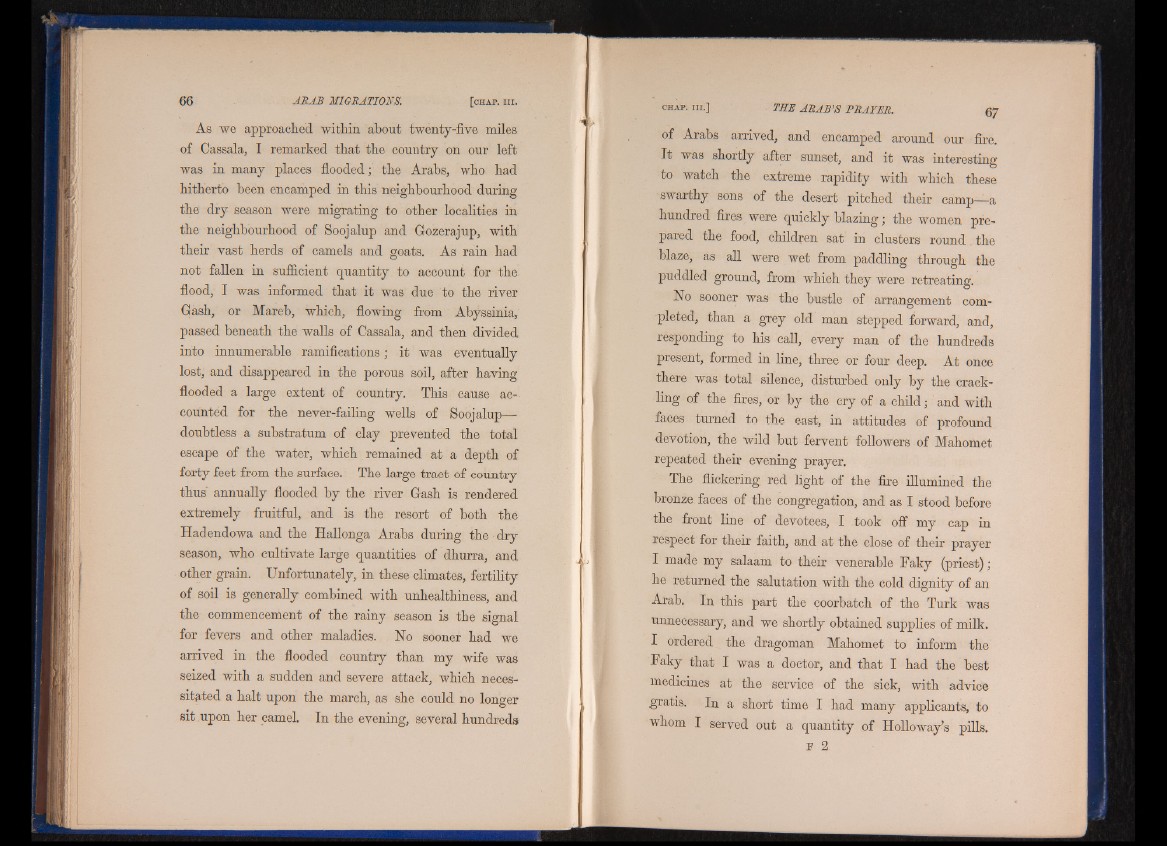
As we approached within about twenty-five miles
of Cassala, I remarked that the country on our left
was in many places flooded; the Arabs, who had
hitherto been encamped in this neighbourhood during
the dry season were migrating to other localities in
the neighbourhood of Soojalup and Gozerajup, with
their vast herds of camels and goats. As rain had
not fallen in sufficient quantity to account for the-
flood, I was informed that it was due to the river
Gash, or Mareb, which, flowing from Abyssinia,
passed beneath the walls of Cassala, and then divided
into innumerable ramifications; it was eventually
lost, and disappeared in the porous soil, after having
flooded a large extent of country. This cause accounted
for the never-failing wells of Soojalup—
doubtless a substratum of clay prevented the total
escape of the water, which remained at a depth of
forty feet from the surface. The large tract of country
thus* annually flooded by the river Gash is rendered
extremely fruitful, and is the resort of both the
Hadendowa and the Hallonga Arabs during the dry
season, who cultivate large quantities of dhurra, and
other grain. Unfortunately, in these climates, fertility
of soil is generally combined with unhealthiness, and
the commencement of the rainy season is the signal
for fevers and other maladies. No sooner had we
arrived in the flooded country than my wife was
seized with a sudden and severe attack, which necessitated
a halt upon the march, as she could no longer
sit upon her camel. In the evening, several hundreds
of Arabs arrived, and encamped around our fire.
It was shortly after sunset, and it was interesting
to watch the extreme rapidity with which these
swarthy sons of the desert pitched their camp—a
hundred fires were quickly blazing; the women prepared
the food, children sat in clusters round the
blaze, as all were wet from paddling through the
puddled ground, from which they were retreating.
No sooner was the bustle of arrangement completed,
than a grey old man stepped forward, and,
responding to his call, every man of the hundreds
present, formed in line, three or four deep. At once
there was total silence, disturbed only by the crackling
of the fires, or by the cry of a child; and with
faces turned to the east, in attitudes of profound
devotion, the wild but fervent followers of Mahomet
repeated their evening prayer.
The flickering red light of the fire illumined the
bronze faces of the congregation, and as I stood before
the front line of devotees, I took off my cap in
respect for their faith, and at the close of their prayer
I made my salaam to their venerable Faky (priest) ;
he returned the salutation with the cold dignity of an
Arab. In this part the coorbatch of the Turk was
unnecessary, and we shortly obtained supplies of milk.
I ordered the dragoman Mahomet to inform the
Faky that I was a doctor, and that I had the best
medicines at the service of the sick, with advice
gratis. In a short time I had many applicants, to
whom I served out a quantity of Holloway’s pills.
F 2